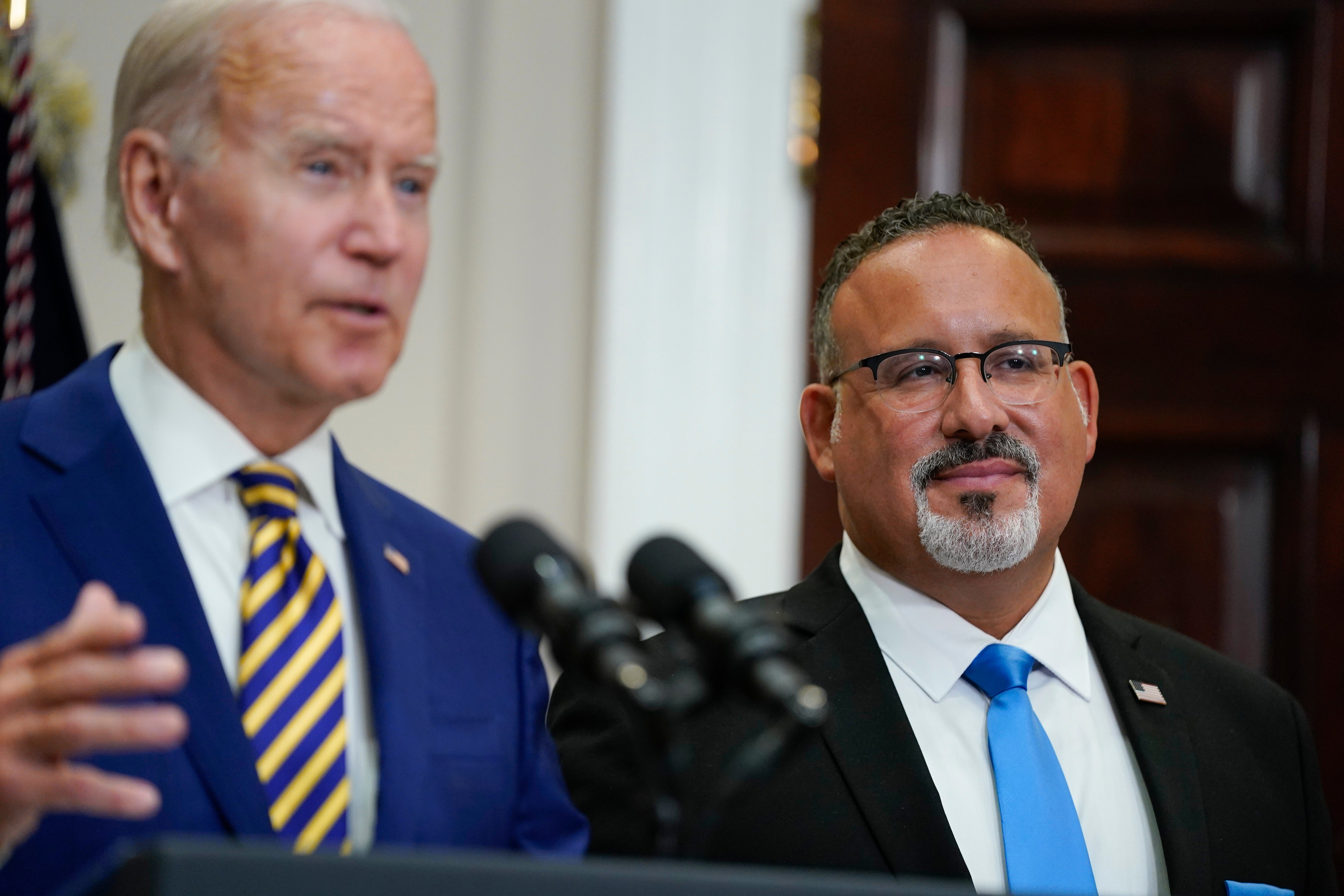Legality of student loan plan relies on pandemic, 2003 law
The Biden administration is tying its authority to cancel student debt to the coronavirus pandemic and to a 2003 law aimed at providing help to members of the military

Your support helps us to tell the story
From reproductive rights to climate change to Big Tech, The Independent is on the ground when the story is developing. Whether it's investigating the financials of Elon Musk's pro-Trump PAC or producing our latest documentary, 'The A Word', which shines a light on the American women fighting for reproductive rights, we know how important it is to parse out the facts from the messaging.
At such a critical moment in US history, we need reporters on the ground. Your donation allows us to keep sending journalists to speak to both sides of the story.
The Independent is trusted by Americans across the entire political spectrum. And unlike many other quality news outlets, we choose not to lock Americans out of our reporting and analysis with paywalls. We believe quality journalism should be available to everyone, paid for by those who can afford it.
Your support makes all the difference.The Biden administration is tying its authority to cancel student debt to the coronavirus pandemic and to a 2003 law aimed at providing help to members of the military. Legal challenges are expected.
Skeptics of the administration's ability to act on its own, without new legislation, had once included President Joe Biden himself and House Speaker Nancy Pelosi.
But in a legal opinion released Wednesday, the Justice Department said that the HEROES Act of 2003 gives the administration “sweeping authority” to reduce or eliminate student debt during a national emergency, ”when significant actions with potentially far-reaching consequences are often required."
The law was adopted with overwhelming bipartisan support at a time when U.S. forces were fighting two wars, in Afghanistan and Iraq. It gives the Education secretary authority to waive rules relating to student financial aid programs in times or war or national emergency.
Former President Donald Trump declared a national emergency in 2020 because of the pandemic, and it remains in effect.
But neither Trump nor Biden, until the president's announcement on Wednesday, had tried to wipe out so much student debt at one time.
The Justice Department's legal justification seemed to be anticipating criticism that the broad-based debt cancellation might run afoul of Supreme Court rulings, including a June decision limiting the administration’s ability to combat climate change.
In that case, the court declared that when dealing with such “major questions,” the administration must point to clear congressional authorization when it asserts new power over an important part of the economy.
The justification for the debt cancellation “seems to tee up nicely -- perhaps inadvertently — a major-questions doctrine challenge as the opinion seems to suggest the agency could forgive all student loans for everyone due to pandemic" if the agency head deemed it necessary, Chris Walker, a University of Michigan law professor wrote on Twitter.
But Abby Shafroth, an attorney at the National Consumer Law Center, said a challenge to the loan-forgiveness plan could falter in several ways, including the specific reference to national emergencies in the 2003 law.
Both the Trump and Biden administrations have previously relied on the HEROES Act to pause loan repayments during the pandemic and, in Biden's case, overhaul a student debt forgiveness program for public workers, Shafroth said.
“Today's action is significant, but not different in kind," she said.
A separate issue may be finding someone who is harmed by the administration's action and has legal standing to sue, she said.
The Job Creators Network, which promotes conservative economic policies, said it was weighing a lawsuit to try and block Biden's plan.
“This executive overreach transfers taxpayer dollars from hardworking ordinary Americans and small businesses to disproportionately higher earners with college degrees,” said Alfredo Ortiz, president and CEO of the group. “It does nothing to address the underlying issue of outrageous college costs. Indeed, it rewards colleges for making education unaffordable and entrenches the failing status quo.”
An Education Department memo, produced in the final days of the Trump administration, concluded that there was no authority to cancel debt on a broad basis.
The department has never invoked the law, or any other statute, “for the blanket or mass cancellation, compromise, discharge or forgiveness of student loan principal balances,” Reed Rubinstein, then an Education Department lawyer, wrote in January 2021.
The issue has been under review for some 18 months, Lisa Brown, the top lawyer at the Education Department, wrote in a separate memo that was released Wednesday and called on Education Secretary Miguel Cardona to rescind Rubinstein's memo.
Pelosi also reversed course. In Las Vegas Tuesday, Pelosi said that she “didn’t know what – what authority the President had to do this. And now clearly, it seems he has the authority to do this.”